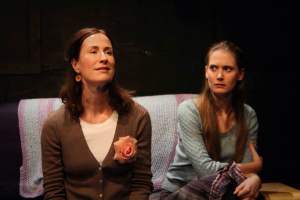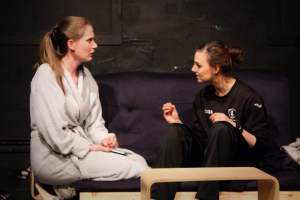At eighty minutes’ run time, Ruby Clarke’s original new play forms a thought-provoking piece of living-room fringe theatre, examining how far individual interpretations can differ when it comes to intimacy and normality. Unlike the wealth of surreal, experimental shows that flood fringe theatre festivals, Border Line, from Postcard Theatre, provides a grounded, lifelike, linear piece of art.
Protagonist Claire (Jenny Owen) has moved into a new teaching job to escape an awkward personal relationship at her old one, which seems only to have transferred into a new friendship that proves to be equally uncomfortable. She is supported by best friend Jackie (Amey Woodhall), who knows her well, and plagued by new friend Stella (Julia Walsh), who is less aware and less welcome.
Clarke has a gift for naturalistic dialogue and this is complemented by a small cast with a comfortable dynamic and great comic timing, and a set that creates a warm, homely environment. Books, blankets and Ikea-style furnishings all set the scene for a safe, light-hearted, relatable story about friends enjoying gossip over cups of tea. Distinct character voices are picked out well and made believable and likeable.
This idle chat quickly descends, however, into a more serious situation, throwing up question after question for the audience to speculate on.
The script is dotted with clever, edgy jokes which are skimmed over by actors and audience alike – this is a play that flows so realistically that you often find yourself having to double-take, like Claire, to check you’ve got your facts straight.
Indeed, in disconcertingly subtle increments, it is revealed that Claire may not have everything straight in her mind.
Perhaps, we learn, it is her own nature that lands her in these distressing situations. Although, pleasingly, the mystery over whether it is Claire’s or Stella’s version of events that is closest to reality is left open, and the audience are left to ponder this, among other important questions, after they have left the theatre.

Often it’s difficult to tell which character’s version of events is true. (Image courtesy of Postcard Theatre)
One takes on a weighty responsibility engaging a discourse around mental health in a time when national awareness is being raised and authorities on the subject are stepping to the forefront of popular culture to address stigma and to take the next steps towards effective collective understanding.
Claire’s story, although seemingly extreme and even absurd at particular moments, is entirely possible and almost relatable, for someone without first-hand experience of her condition. It is handled sensitively by director John-Mark Reid and the cast, nurturing Clarke’s delicate script. In one short play, the writer tackles the meaning of friendship, the importance of communication, the value of support, and the boundaries of intimacy.





